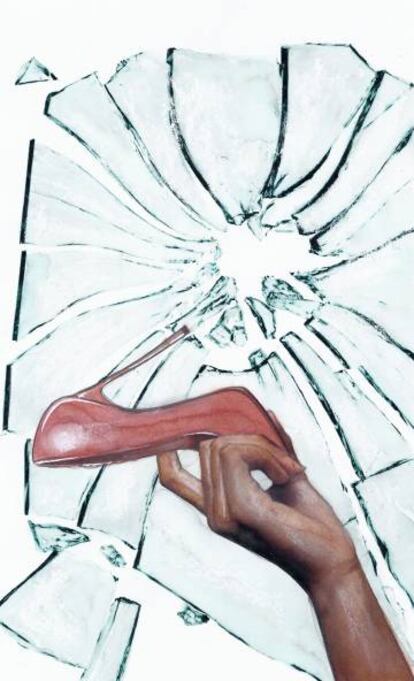To the Goya film awards... In my pajamas
#MeToo cannot just be limited to a fleeting hashtag, writes Spanish film director Isabel Coixet. It should lead to genuine change between men and women so that there is real dialogue, leaving no doubts as to what is good and what is bad

Recently I have been feeling like Bartleby, the Scrivener from the Melville Stories when, during the 500 interviews I have given over the past few days, the moment invariably arrives and I am asked what I think of the #MeToo movement and the reported abuse. I would rather not answer. I honestly believe that it is impossible to give an opinion in two soundbites on either of these topics and it’s obvious that what the interviewers want you to do is to rise to the bait and show how indignant, empathetic, angry and vindicated you feel. No one appears genuinely interested in the reality beyond the sexual harassment suffered by female directors, actresses, female producers, photographer and scriptwriters.
I sincerely hope #MeToo does not become just another passing hashtag but a real trigger for change in the way men and women behave toward each other, resulting in proper dialogue that clears up any doubts concerning what is acceptable and what is not. Welcome then to #MeToo and #TimesUp and all that is needed for this to stir things up and throw into question the dreadful behavior that has been considered normal until now. Sexual harassment is, however, only a symptom; a part of the problem.
Women of my generation wanting to live in a man’s world have had no alternative but to pretend to be tough and avoid playing the victim like the plague
Women of my generation wanting to live in a man’s world have had no alternative but to pretend to be tough and avoid playing the victim like the plague. We have sidestepped advances, attacks, injustices, insults and mockery by gnashing our teeth and pretending they have nothing to do with us, even if they do. We have desperately tried to fit in and be just another member of the boy’s club and, to do so, we have made out that we find the sexist jokes funny.
When I am asked for the thousandth time why there are not more female directors, what comes to mind is the first time I directed something, which happened to be an industrial documentary. The client appeared halfway through the shoot, knowing perfectly well that I was directing, and shouted, “Who is the director? I don’t see him!” So I bit the bullet and, red-faced, approached him and said, “It’s me.” He looked me up and down and went, “Ah,” with an expression somewhere between disbelief and disgust that I will never forget, and he went to sit down. I continued to shoot, trying not to let the film crew see how I upset I was. It was only when I got back home that I allowed myself to feel the shame and anger, but I knew too that if I wanted to continue in this line of work, it wouldn’t be the last time I would be in a situation like that.
Since that shoot 30 years ago, I have seen it all. On top of the neurosis of the world’s male directors, female directors have an extra burden, which is being on terrain that no one has ever conceived of us being on. To start with, the cameras and all the accessories have been thought up by men for men and if, as is my case, you operate the camera, you realize that having breasts is a handicap – I have often had to bind them flat in order to be able to do my job. Then there is the matter of authority. How often have I pretended to be furious to get something done because if you’re polite no one takes a blind bit of notice? That’s from asking for a coffee to asking for a wall of the set to be moved or insisting one hundred times on a specific location because it was precisely there that I wanted to shoot; or negotiating a contract and asking for my name to appear in the same size font as the producer’s.
No male director is asked what he does with his children when he is on a shoot.
No male director is asked what he does with his children when he is on a shoot. The exhaustion women feel when they finally arrive at the role of director is something we don’t even recognize as having anything to do with being female. It has taken me years to admit that yes, things have been a thousand times harder for me and the criticism a thousand times harsher – because they have even targeted my body, the way I speak, my shyness and even my name. It’s all been a lot harder and I have been paid considerably less than my male colleagues who have not had to put up with any of it. No male director is asked what he does with his children when he is on a shoot or is told snidely how “prolific” he is or is interrupted during the shoot to be told he has to pick his child up from school because he or she has a temperature. Not one. Nor does anyone lay into them for making masculine films whereas female directors have to defend and justify both actively and passively the right to tell stories about people who make their own beds, which for me is the real test of whether the director of a film is male or female because in films written and directed by men, as in real life, none of the characters think to do it.
So when positive discrimination and quotas are scathingly brought up – this, by a number of women as well as men – it occurs to me that they could be considered a kind of historical redress: for centuries we have had it far harder so the quotas are the best, most direct way to redress the imbalance. And what I find even more hilarious is the argument – that I have heard from more than three directors – that by discriminating in favor of women we are favoring a lot of mediocre filmmakers, as though all men were geniuses.
When positive discrimination and quotas are scathingly brought up it occurs to me that they could be considered a kind of historical redress
Now that the Goya Awards are approaching, an idea has occurred to me to highlight inequality and harassment and the tyranny of the red carpet that obliges women to wear long gowns while balancing on impossibly high heels when men can get off with wearing a tuxedo. To go in pajamas and slippers with no make-up – it seems to me to be a lot more fun than putting on a black dress worth €10,000 from Dolce & Gabbana.
The initial response to my proposal was nervous giggles. “You’re not being serious!” and then there was an eloquent silence. “It would go viral!” I insisted. “People would talk about it all over the world!” But apart from three other nuts like me, I couldn’t convince anyone. So the Goya audience will miss the chance this year of seeing me in my Hello Kitty pajamas and unicorn slippers. Even vindications have their limits when faced with the chance to dress up and wear heels…
Isabel Coixet is a film director.
Tu suscripción se está usando en otro dispositivo
¿Quieres añadir otro usuario a tu suscripción?
Si continúas leyendo en este dispositivo, no se podrá leer en el otro.
FlechaTu suscripción se está usando en otro dispositivo y solo puedes acceder a EL PAÍS desde un dispositivo a la vez.
Si quieres compartir tu cuenta, cambia tu suscripción a la modalidad Premium, así podrás añadir otro usuario. Cada uno accederá con su propia cuenta de email, lo que os permitirá personalizar vuestra experiencia en EL PAÍS.
En el caso de no saber quién está usando tu cuenta, te recomendamos cambiar tu contraseña aquí.
Si decides continuar compartiendo tu cuenta, este mensaje se mostrará en tu dispositivo y en el de la otra persona que está usando tu cuenta de forma indefinida, afectando a tu experiencia de lectura. Puedes consultar aquí los términos y condiciones de la suscripción digital.








































